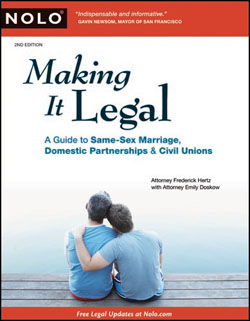Legally Speaking
Navigating marriage equality laws in your state
By Frederick Hertz
| Q We live together in South Carolina, a state that does not recognize same-sex partnerships or marriages. We plan to get married in Washington, D.C. next month. What is the most prudent course of action for us to take, given our concerns about life in South Carolina? |
| A First of all, you are free to get married in our nation’s capital, as there is no residency requirement for getting married there (or anywhere else in the United States). You need to be sure that neither of you is still married (or civil union or domestically partnered) to your ex, and you need to obtain a D.C. marriage license, but you need not live in the District in order to marry there. Second, even though your home state does not currently recognize your marriage, your marriage is still legally valid. That is important, as one day soon we expect that the federal government agencies will extend all the marital rights (and duties!) on you as a couple. And if you should relocate to a marriage-recognition state (or to D.C.) or South Carolina wises up, you will be considered married, retroactive to the date of your marriage. I am also pleased to report that Ms. Manners recently opined that you should feel free to refer to your spouse as your wife, even if your marriage is not legally recognized in South Carolina. But third, and this is what is most problematic, is that as of now neither the federal government nor the state of South Carolina will recognize your marriage—even though it is legally valid. So, you ask, what does that mean for the two of you, legally speaking? 1. You will be considered legally single, both under your state law and the federal law. None of the state or federal governmental benefits bestowed on married couples will apply to you (such as tax exemptions, Social Security protections or intestacy protections). At the same time, your “single” status may actually help you from time to time, for example, as it won’t disqualify either of you from receiving a federal benefit based upon your partner’s higher income. 2. The private sector in your state (i.e. your employer) may or may not recognize your relationship—either because of your having gotten married or simply because you live together. You should check with your employer to learn where things stand, so you don’t make any unwise mistakes about benefits or insurance coverage, but you should be aware that they probably have the right to refuse to extend benefits to you. 3. Chances are, you will need some protections in the event of dissolution or death of either of you, and so you should make sure to draft and sign the documents that provide those benefits. If you are co-parenting children, you should try to obtain a second-parent adoption for the non-biological parent. You definitely should draft and sign wills or trusts and powers of attorney to protect each other in case of illness or death. And if you own property or have significant financial assets, we recommend that you put together a written agreement that determines who gets what in the event of a breakup—since the marital law rules won’t apply to your divorce. 4. Lastly, and most painfully, if you do break up, you probably won’t be able to get a divorce in South Carolina unless the law changes there, because most judges in non-recognition states view granting a divorce as a perverse form of “recognition” of your marriage. And unlike the absence of any residency rules for getting married, every state in this country has strict residency rules for obtaining a divorce. As a result, one of you will have to relocate to a marriage-recognition state for the required minimum months (sometimes six months, sometimes a year) before you can file for the divorce. If you break up, you can go ahead and live apart, settle out your financial issues and even work out the issues to co-parent your children—but you won’t be able to be totally free to remarry until you have met these residency requirements. Hopefully your marriage will not end anytime soon, and hopefully, not until death do you part. And, if it does, hopefully it will endure longer than the widespread bans on marriage equality—in which case you will be free to obtain a divorce just like a heterosexual couple. |
Frederick Hertz is an attorney and the author of Making It Legal: A Guide to Same-Sex Marriage, Domestic Partnerships & Civil Unions and A Legal Guide for Lesbian & Gay Couples, both published by Nolo Press in Berkeley, California (Emily Doskow, co-author). For more information visit www.MakingItLegal.net.
MOST VIEWED STORIES
- These nonbinary cosplay lovers brought anime to life for their ethereal wedding
- Sweet lesbian proposal on a gondola [VIDEO]
- Navy and green wedding for Disney lovers in Beacon, New York
- Ensuring Inclusivity: 5 Considerations for Guests with Disabilities on Your Wedding Day
- Greenhouse wedding in Downtown Los Angeles for two brides


























